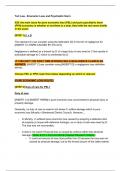Exam (elaborations)
Tort Law - Economic Loss and Psychiatric Harm (Exam Plan)
- Course
- Institution
I scored 75% in Tort Law and received a Distinction (74%) overall in the GDL at the University of Law using these notes. These notes are written in the form of step-by-step exam plans. Compared to standard notes, this will save you lots of time. Most people will make notes during workshops, and ...
[Show more]



